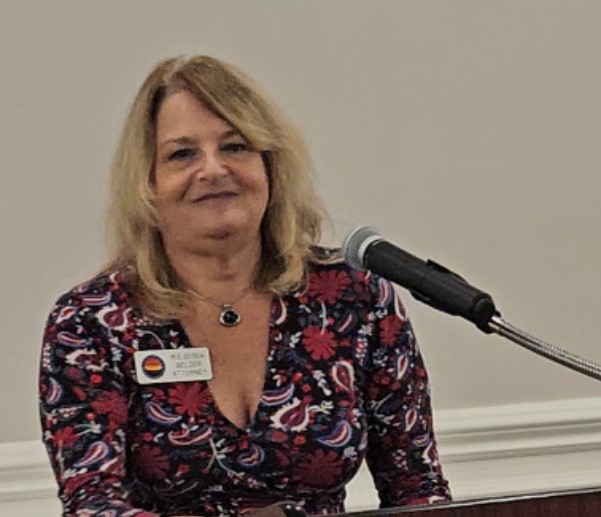Craft Talk by Regina Gelzer, Esq.
At our OCBA lunch meeting on October 3, 2024, Regina Gelzer, Esq., shared valuable insights into her dual practice areas of bankruptcy and New Jersey real estate law. In her craft talk, she focused on the current state of the residential real estate market, particularly the rise in foreclosures, and discussed how new legislation is addressing this growing issue in NJ.
The Foreclosure Surge: What’s Behind It?
Regina began by addressing the surge in foreclosures, a trend that has been rising due to multiple factors. One significant reason is the bottleneck caused by the pandemic. During that time, foreclosure actions were paused or delayed, but now, many homeowners who have fallen behind are facing foreclosure. This has led to a surplus of bank-owned properties sitting vacant, further complicating the housing market.
Investors and the Housing Market Disruption
One of the major concerns Regina highlighted is the influx of investors buying up these foreclosed properties. Rather than these homes returning to the market for first-time buyers or downsizing families, they are being converted into expensive rentals or flipped at prohibitively high prices. This is disrupting homeownership opportunities across New Jersey, particularly for young couples or those looking to downsize, as many starter homes are now out of reach.
A Legislative Response: The Community Wealth Preservation Act
In response to this growing problem, the State of New Jersey has enacted the Community Wealth Preservation Act, a significant change to the state’s foreclosure laws. Effective as of January 12, 2024, this law gives homeowners and their families new opportunities to reclaim their foreclosed properties.
Key provisions of the law include:
- Right of First Refusal: Homeowners now have the right to repurchase their foreclosed property at a sheriff’s sale by putting down 3.5% on the day of the sale and securing the remaining funds within 90 days.
- Family Protections: If the homeowner is deceased, their next of kin has the right of first refusal.
- Nonprofit Involvement: If homeowners or their families are unable to reclaim the property, nonprofit community development corporations can step in and purchase the foreclosed homes.
- Owner Occupancy Requirement: To prevent investors from flipping these properties, the law mandates that any purchased foreclosure must be owner-occupied for at least eight years.
The Intersection of Bankruptcy and Real Estate
Regina also touched on how her two practice areas—bankruptcy and real estate—intertwine. Many individuals facing foreclosure are also dealing with bankruptcy, and navigating both legal arenas requires a nuanced understanding. While bankruptcy may disqualify some individuals from funding options, the involvement of nonprofit organizations under the new law provides alternative solutions for those looking to keep their homes.

Legislative changes are aiming to address the imbalance caused by investor-owned properties
Regina’s talk offered a comprehensive view of the challenges facing New Jersey’s real estate market and how legislative changes are aiming to address the imbalance caused by investor-owned properties. Whether you are facing foreclosure or are considering real estate transactions, Regina Gelzer, Esq., is a trusted professional in both bankruptcy and real estate law, helping clients navigate complex legal landscapes.
Regina’s talk offered a comprehensive view of the challenges facing New Jersey’s real estate market and how legislative changes are aiming to address the imbalance caused by investor-owned properties. Whether you are facing foreclosure or are considering real estate transactions, Regina Gelzer, Esq., is a trusted professional in both bankruptcy and real estate law, helping clients navigate complex legal landscapes.
Call 732-608-0560 or visit gelzerlaw.com If you have questions about your own foreclosure situation or need assistance with a New Jersey real estate transaction, you can count on Regina Gelzer’s expertise.
